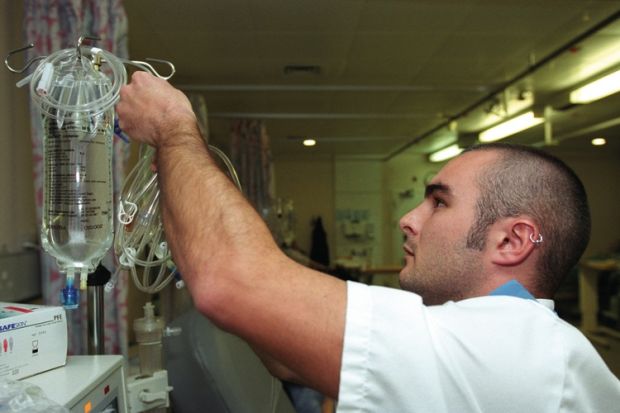Source: Alamy
Men should be encouraged into female-dominated subjects such as nursing, teaching and social work, just as science and engineering is promoted to women, the head of Ucas has argued.
Mary Curnock Cook pointed out that although women were outnumbered in subjects such as computer science, the gender discrepancy was actually greater in nursing, for example.
“We hear all these things about [getting] more women into science, and women doing physics, and computers and so on,” she told the annual conference of the Association of University Administrators in Manchester on 15 April.
But she asked: “Why don’t we hear more about getting men into nursing and education and social work where, after all, there’s a very ready supply of a very large volume of jobs?”
In all types of engineering, it would take just over 15,000 extra female students to balance out the current male dominance of the subject, she said. But in subjects allied to medicine, which includes nursing, the number of extra men needed was close to 30,000, she said.
Yet action over gender imbalances at university was “about women who are disadvantaged compared with men”, she said. “Why wouldn’t you set out to make it more socially acceptable for young men to go into nursing and teaching?” she asked.

“Maybe some of the issues we’ve got with male education would be improved by having more male primary and secondary teachers,” Ms Curnock Cook said. She added that boys being taught English literature in classes with a majority of girls and by female teachers “doesn’t always make for young men who love English literature”. “I don’t see anything happening in education policy to tackle this issue,” she said.
She made the broader point that there was a now a “huge sociological and widening participation issue” because women were so much more likely to apply to higher education than men.
Women are a third more likely to apply to university and are actually as likely to enter higher education as men are to apply for it, she explained.
Not only was this a social issue but it was also a recruitment and demand problem for universities, she said. If boys applied to universities at the same rate as girls, there would be a “huge boost” in demand for higher education.
The deficit of female students studying some science, technology, engineering and mathematics (STEM) subjects has led to a number of initiatives, including WISE, which looks to boost the number of women working in STEM fields by creating a “pipeline” through school and university to the workplace.
The under-representation of women in scientific careers was the subject of a report by the House of Commons Science and Technology Committee earlier this year.
The Athena SWAN awards have also encouraged better support for women pursuing careers in science, and it has been suggested that research councils could link such awards to funding.
Register to continue
Why register?
- Registration is free and only takes a moment
- Once registered, you can read 3 articles a month
- Sign up for our newsletter
Subscribe
Or subscribe for unlimited access to:
- Unlimited access to news, views, insights & reviews
- Digital editions
- Digital access to THE’s university and college rankings analysis
Already registered or a current subscriber? Login





